They’d Rather Be Right (1955)
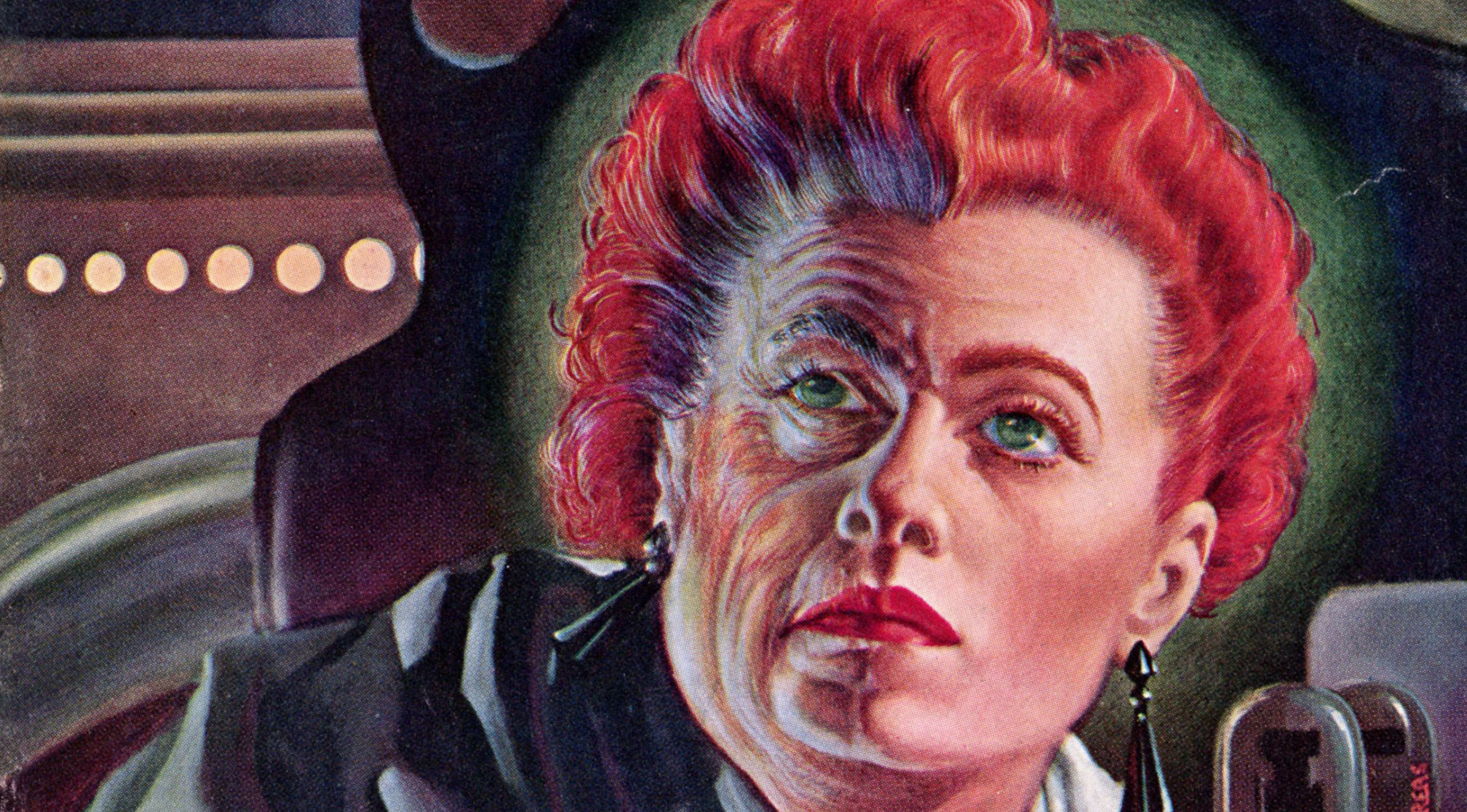
The second Annual Science Fiction Achievement Awards actually took place two years after the first at The Clevention in Cleveland, though history doesn’t record why the committee of SFCon in 1954 chose not to include the awards on their program. The awards this year were once again chosen by ballot, and once again there was only a single round of voting so no shortlist, though this time around the vote wasn’t just limited to attendees but was open to anyone who could get their hands on a ballot, a practice which continued through until 1959.
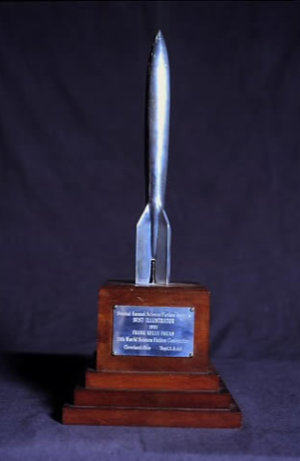
The question of which books might have made it on to the hypothetical 1955 shortlist is a tough one to answer, what with the slew of great works that came out in the previous year. Titles that stand out include Asimov’s Caves of Steel, Richard Matheson’s I am Legend, Brain Wave and The Broken Sword by Poul Anderson, Hal Clement’s Mission of Gravity (sometimes referred to as the only true hard sci-fi novel) and the first two books in a rather famous trilogy by a certain J. R. R. Tolkien. There are also books by Heinlein, Andre Norton, E. E. “Doc” Smith and L. Ron Hubbard, none of which would have been out of place on a Hugo ballot. However, as it turns out the winner was a book which has since gone on to earn the epithet of the worst book to ever win a Hugo: They’d Rather Be Right, by Mark Clifton and Frank Riley.
The Authors: Mark Clifton (1906-1963) and Frank Riley (1915-1996)
Mark Clifton was a reasonably successful science fiction author, with several works to his name in the fifties. He collaborated a few times with Alex Apostolides during his early career, most notably on Crazy Joey and Hide! Hide! Witch!, the two short pieces to directly precede They’d Rather Be Right in 1953. His other noteworthy works include Eight Keys to Eden (1960) and When They Come From Space (1962). Unfortunately, his fame didn’t last for long, resulting in him receiving the Cordwainer Smith Rediscovery Award in 2010 as a result of his unjust obscurity. Several of his works are now in the public domain and can be found at Project Gutenberg.
Frank Riley (pen name of Frank Rhylick) had a less notable career as a sci-fi writer, with only a handful of short stories making it into print, specifically in the pages of If magazine between 1955 and 1958. As with Clifton’s work, much of this is now public domain and available at Project Gutenberg.
The Book: They’d Rather Be Right (1954)
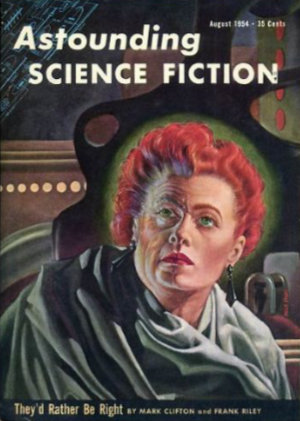
Initially published between August and November 1954 as a four-part serial in Astounding Science Fiction magazine, They’d Rather Be Right explores the concept of a machine with the power to grant eternal youth and telepathic powers, but only to those subjects who are willing to let go of their ingrained prejudices and beliefs.
The novel itself is a sequel to the earlier stories Crazy Joey and Hide! Hide! Witch!, the first of which introduces the telepathic protagonist Joe “Joey” Carter as a young child just beginning to understand his psychic powers, while the second covers the initial creation of the cybernetic brain, “Bossy”, and the way her creation leads to an almost literal witch hunt.
Picking up more-or-less immediately after the second of these stories, the novel follows Joe Carter and the two professors most involved in Bossy’s creation as they attempt to rebuild the machine in secret. For the two professors, Bossy is a tool for optimising the way people think, though they’re unaware that Joey has other hopes for the machine’s powers.
When Bossy’s first test subject inadvertently finds herself in the public eye, Joe and his colleagues call upon the help of wealthy industrialist, Howard Kennedy, to bring the machine out of hiding and to get the public on their side before the government can confiscate it from them.
Since its original appearance in Astounding, the book has only been in print a few times. A heavily cut version was released under the title The Forever Machine in 1957, but only racked up a couple of reprints over the years. The most recent edition was published by Carroll & Graf as The Forever Machine in 1992, and included the two prequel stories as the first half of the book under the title Crazy Joey, with They’d Rather Be Right making up the second half of the book under the title Bossy.
The Review
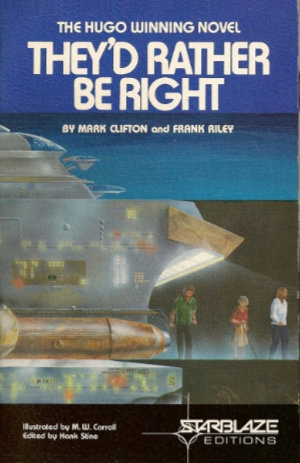
Exactly how this book managed to win the Hugo Award for Best Novel is something of a mystery. It is regularly described as the worst book to ever win the award, and there are a number of theories about how it got there in the first place, though nothing concrete. One suggestion is that it benefited from a block vote by Scientologists, a plausible explanation if you consider the way in which the narrative identifies psychology as a self-serving cult. Another block-voting theory suggests that fans of Astounding nominated it en masse as a kickback against the previous winner being from the pages of Galaxy, a publication they didn’t consider to be a true Sci-Fi magazine. However, the most likely explanation is that most of the voters cast their ballots for the book without reading it, relying on author Mark Clifton’s popularity as a short story writer to carry the result. Whatever the truth, it’s plain to see that controversial outcomes have been a part of Hugo history for almost as long as the awards themselves.
In terms of the writing itself this is a fairly adequate novel. There’s nothing particularly outstanding about the narrative or the way in which the characters are presented, to the point that none of the protagonists really stand out as anything special. Likewise, the themes explored aren’t exactly groundbreaking, and there are a lot of loose ends by the close of the story that it simply feels unfinished.
Conclusion
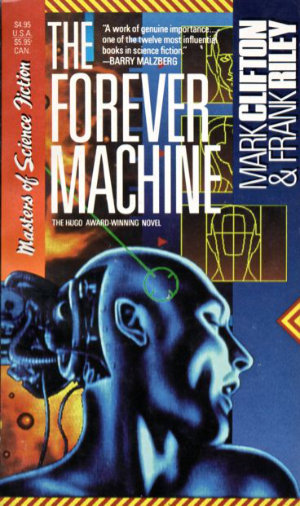
It has to be said that there isn’t anything inherently bad about this book, but there really isn’t anything to commend it either. When you stack it up against the wide array of other books to win the Hugo over the years, it definitely doesn’t stand up well. In fact, it’s hard to imagine a book like this even finding a publisher today. There’s a reason it’s barely been in print for the last sixty-five years.
At best, it scores two-and-a-half stars out of five, and if I’m being honest that’s a kindness. If you’re really determined to read every Hugo winning novel ever then go for it, but don’t expect anything too spectacular from this one.
Coming Next
Next time we get to dive into something with a better pedigree as we crack open the first of four wins for Robert A. Heinlein. Double Star tells the tale of down-and-out actor Lawrence Smith, aka The Great Lorenzo, after he’s hired to impersonate the highly respected politician John Joseph Bonforte.